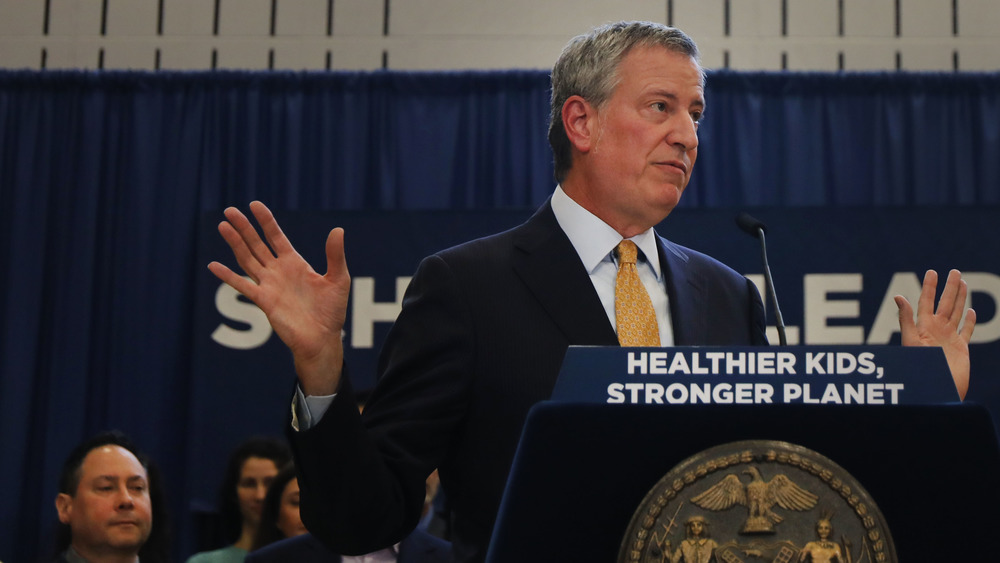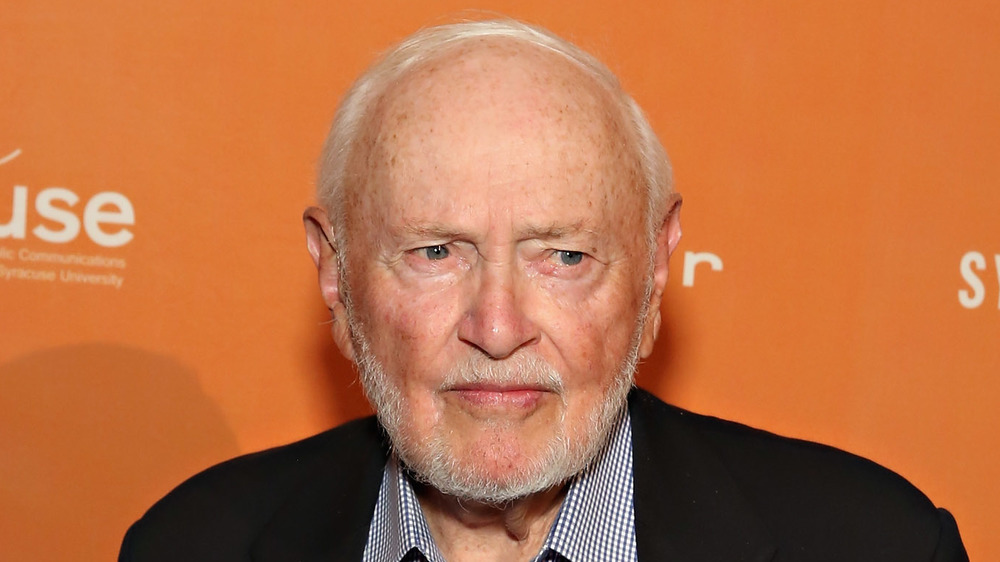The Untold Truth Of Meatless Mondays
You're probably familiar with the term "Meatless Mondays." Maybe you've even participated in the phenomenon, trading breakfast bacon for tofu scramble or a lamb shank dinner for lentil soup. The term for swapping meat for plant-based protein one day a week didn't just appear out of thin air, and it isn't some slang term that just happened to catch on worldwide. It's a large-scale campaign with a storied history that has had far-reaching impact on the way we eat and think about food. And it's no surprise that it's also managed to make some enemies along the way.
A 2020 Gallup poll found that about one in four Americans have reduced their meat consumption in the last year, with only 5 percent reporting an increase in meat intake. Meatless Mondays (and its UK equivalent, Meat Free Mondays) is a likely influence, planting the idea that a little protein variety isn't such a bad thing for an omnivore. Here is the untold truth of Meatless Mondays.
Meatless Mondays was a coordinated campaign
According to its official site, Meatless Mondays was created in 2003 by Sid Lerner as a way to improve the health of both humans and the environment. Lerner created Meatless Mondays in collaboration with the Johns Hopkins Center for a Livable Future, a department within the Johns Hopkins Bloomberg School of Public Health focused on building a "healthy, equitable, resilient food system."
Since the term was popularized, many institutions have gone on to implement Meatless Mondays into their own food programs, from colleges to hospitals to acclaimed restaurants. According to the Meatless Mondays website, there are over 40 countries that partake. A 2010 feature in NPR mentions Baltimore schools, celebrity chef Wolfgang Puck, and Michelin-starred Upper West Side restaurant Dovetail as participants. Karen Campbell, who implemented Meatless Mondays at Northern Kentucky University, told NPR that the campaign was "spreading like wildfire."
It's still going strong: In 2019, New York City mayor Bill De Blasio (pictured above) announced the city's public schools would start observing Meatless Mondays every week.
The term has a long history
Though the Meatless Mondays campaign formally began in 2003, its history goes back a lot further. According to PBS, it stretches all the way back to World War I and former president Herbert Hoover's role in the government before he became president. Per PBS, Hoover took over President Woodrow Wilson's new Food Administration in 1917. There were food shortages brought on by wartime, but the US didn't want to immediately resort to rationing food.
The solution? "Meatless Tuesdays" and "Wheatless Wednesdays." Why the government opted for one catchy alliteration yet chose Meatless Tuesdays instead of the more obvious Meatless Mondays is anybody's guess.
Though it was more aimed at feeding soldiers abroad than improving the health of Americans, Hoover's campaigns had a similar effect to the modern Meatless Mondays (via The Takeout). As PBS explains, individual consumers reduced their consumption of these food items in their home, getting their protein from foods like nuts instead of meat and, per Atlas Obscura, baking with gluten-free flours instead of traditional wheat flour. Institutions like hotels and restaurants also took part, saving literally tons of meat in the process.
Founder Sid Lerner has a personal connection to the topic
Meatless Monday founder Sid Lerner (pictured above), who died at age 90 in January 2021 (per Johns Hopkins Bloomberg School of Public Health), wasn't always dedicated to changing diets. However, he's no stranger to influencing the public. As his Columbia University biography notes, Lerner had a long career in advertising and marketing as one of the original "mad men" working on Madison Avenue. Per his New York Times obituary (posted at Legacy), Lerner worked for giants like Procter & Gamble and had a hand in well-known campaigns like Charmin's "Please Don't Squeeze the Charmin" ad.
Lerner's own diet was a catalyst for Meatless Mondays. In an interview with NPR, he explains his father died of heart disease, and he had a doctor tell him his cholesterol and blood pressure was also problematically high. Wanting to make a change, he modified his meat consumption, treating the protein more like a "condiment" than a main facet of a meal.
His marketing background helped give the Meatless Mondays campaign the impact it has today. As he told NPR, he chose Monday because it's the start of the week and thus "ripe for change."
The meat industry isn't a fan
It may not be a surprise to hear that the meat industry wasn't thrilled to learn of a campaign dedicated to reducing the consumption of the very thing they've dedicated their careers to. In 2012, TIME reported that the USDA mentioned Meatless Mondays in one of their internal newsletters, framing it as "one simple way to reduce your environmental impact while dining at our cafeterias."
The backlash was swift — per TIME, everyone from the president of the National Cattlemen's Beef Association to Republican Senator Chuck Grassley publicly condemned both Meatless Mondays and the USDA's supposed endorsement of it. In response, the USDA removed the memo and tweeted that they do "not endorse Meatless Mondays" (via ABC News).
Speaking with ABC News, Monday Campaigns president Peggy Nue expressed confusion at the USDA's reversal, pointing out that the USDA's official dietary guidelines mention reducing meat consumption.
It's not just newsletters riling up carnivores. In 2010, the Denver Post reported that meat industry lobbyists sent cease and desist letters to Baltimore public schools, one of the first institutions to adopt Meatless Mondays on a broad scale.
Eating meatless can have real benefits
Though the meat industry will deny it, skipping meat does in fact have confirmed benefits. Writing for the Food Network website, Registered Dietician Toby Amidor articulates support for Meatless Mondays, noting that excessive meat consumption means excessive saturated fat and cholesterol, which can lead to heart disease and other afflictions. Harvard Health also claims that vegetarian diets tend to correlate with lower cholesterol, blood pressure, and BMI.
Reducing meat consumption can also have an environmental impact. In 2019, The New York Times recommended eating 25 percent less meat, which could potentially reduce greenhouse gas emissions by 82 million metric tons. A study in Inverse recommended countries reduce their carbon footprint by replacing animal products like meat and dairy with "plant-based substitutes."
While not everyone specifically skips meat on Mondays, the philosophy of not eating meat for every meal is still thriving to this day. This way of eating has other names: flexitarianism (via the BBC), reducetarianism (via The Washington Post) – even the Mediterranean diet is technically in line with a lifestyle that eats meat in moderation (via Harvard Health).
There are now entire industries marketing to meat eaters who are looking to reduce their meat consumption without going fully vegetarian or vegan. As NBC News reveals, 89 percent of people buying products from Beyond Meat and Impossible Foods, which offer realistic substitutes to sausages and burgers, are omnivores.





